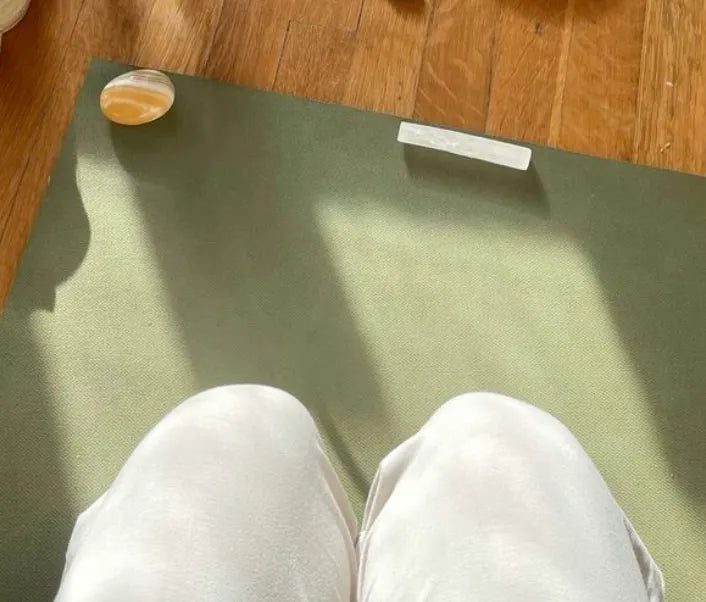Sleepless nights can feel like a lonely battle. You’re exhausted but wide awake, your mind racing, or your body drenched from a hot flush. For many women, menopause insomnia feels like yet another way hormones disrupt life, taking away the peace and recovery that sleep should provide.
At The SABI, we’ve heard this story from countless women navigating menopause. The changes in oestrogen, progesterone, and cortisol not only affect your body but can deeply impact your emotional and mental wellbeing. Mindfulness offers a way to reconnect with your body and calm the hormonal chaos, helping you ease into a night of rest—naturally and gently.
How Mindfulness Works with Hormonal Changes During Menopause
Mindfulness focuses on grounding yourself in the present moment, and its effects are both physiological and psychological. When it comes to menopause, mindfulness can help with the following hormone-driven sleep challenges:
1. Calming Cortisol Spikes
Cortisol, the stress hormone, often rises during menopause due to hormonal imbalances. Elevated cortisol levels:
-
Keep your mind alert, making it harder to fall asleep.
-
Disrupt your sleep cycle, preventing deep, restorative rest.
Mindfulness practices like meditation and controlled breathing directly reduce cortisol, helping your body and mind unwind.
2. Soothing the Effects of Oestrogen Decline
As oestrogen levels drop, your body becomes more sensitive to stress, and serotonin production decreases. This leads to:
-
Increased Anxiety: Racing thoughts and restlessness make it difficult to relax at bedtime.
-
Mood Swings: Emotional highs and lows further disrupt your ability to wind down.
Mindfulness helps counteract these effects by encouraging relaxation and stabilising mood, giving your mind a sense of calm before sleep.
3. Supporting Your Body During Night Sweats and Hot Flushes
Hot flushes are a common menopause symptom caused by oestrogen fluctuations. These sudden heat surges not only wake you up but also heighten feelings of stress and discomfort. Mindfulness techniques can help you:
-
Focus on your breath to steady your nervous system during a hot flush.
-
Shift attention away from discomfort, reducing its intensity and impact.
Mindfulness Practices for Tackling Menopause Insomnia
Integrating mindfulness into your evening routine doesn’t have to be complicated. These simple techniques can make a big difference in improving your sleep:
1. Evening Meditation
Spend 10 minutes before bed focusing on your breath or following a guided meditation. This practice helps lower cortisol and quiet racing thoughts, creating a sense of calm. Pair this with a cup of our sleep tea to further enhance relaxation.
2. Progressive Muscle Relaxation (PMR)
This technique involves tensing and then relaxing different muscle groups, releasing physical tension caused by stress. PMR can help your body transition into a state of rest.
3. Mindful Breathing During Night Wakes
If you wake up during the night due to a hot flush or anxiety, practise the 4-7-8 breathing method:
-
Inhale for 4 seconds, hold for 7 seconds, and exhale for 8 seconds.
This simple technique calms your nervous system and makes it easier to fall back asleep.
4. Body Scan Meditation
Lying in bed, focus on each part of your body, starting from your toes and moving upward. This helps shift your attention away from stress or discomfort and into the present moment, promoting relaxation.
Pairing Mindfulness with Supportive Habits
Mindfulness becomes even more effective when combined with other hormone-friendly practices:
-
Sip Our Sleep Tea: A cup of our calming sleep tea before bed helps reduce cortisol and promote relaxation. Ingredients like chamomile, lavender, and passionflower soothe the mind and body, preparing you for restful sleep.
-
Cool Your Environment: Keep your bedroom at a comfortable 16–18°C (60–65°F) to minimise hot flushes.
-
Stick to a Sleep Schedule: Going to bed and waking up at the same time each day helps stabilise your sleep-wake cycle.
Reclaim Your Nights with Mindfulness
Mindfulness isn’t just a tool for relaxation—it’s a way to work with your body during the hormonal changes of menopause. By calming your nervous system, reducing cortisol, and creating a sense of balance, mindfulness can help you overcome menopause insomnia and rediscover restful sleep. Pair these practices with a soothing cup of our sleep tea and turn your evenings into a time of peace and self-care.
Because every woman deserves a night of rest that leaves her feeling energised and ready for the day ahead.
References
-
National Institutes of Health: Cortisol and Sleep Regulation (https://pubmed.ncbi.nlm.nih.gov/19707017/)
-
Journal of Sleep Research: Mindfulness and Sleep Quality in Women (https://pubmed.ncbi.nlm.nih.gov/32066548/)
-
Journal of Hormonal Health: Managing Menopause Insomnia Naturally (https://pubmed.ncbi.nlm.nih.gov/29281225/)
HORMONAL & PROUD
Created as a brand to help women navigate the toughest moments in pregnancy, childbirth, postpartum — and practically every stage of life –– The SABI aims to change the narrative around our hormones from one of taboo, embarrassment, and loneliness to awareness and pride. As more than a wellness brand, The SABI offers a carefully-crafted line of products to carry you through your hormonal journey, including rituals, supportive tools, and ancient herbal remedies that have been tested time and time again by women and now come backed by medicine. The SABI is a blend of science and nature conceived by women who have experienced the joys and deep struggles of bringing a child into the world, the pains of a heavy, difficult period, miscarriage, and difficulty conceiving.
We offer you an invitation to get to know your body and its cycles better –– an invitation to really understand what is going on inside. Learn to use your hormonal cycle to your advantage no matter your stage of life, and know that you can support and balance your hormone levels. Look for the right sources of information. Know that there is help, and know that you’re supported.
-
DISCLAIMER
The SABI blog and articles are not meant to instruct or advise on medical or health conditions, but to inform. The information and opinions presented here do not substitute professional medical advice or consultations with healthcare professionals for your unique situation.
















